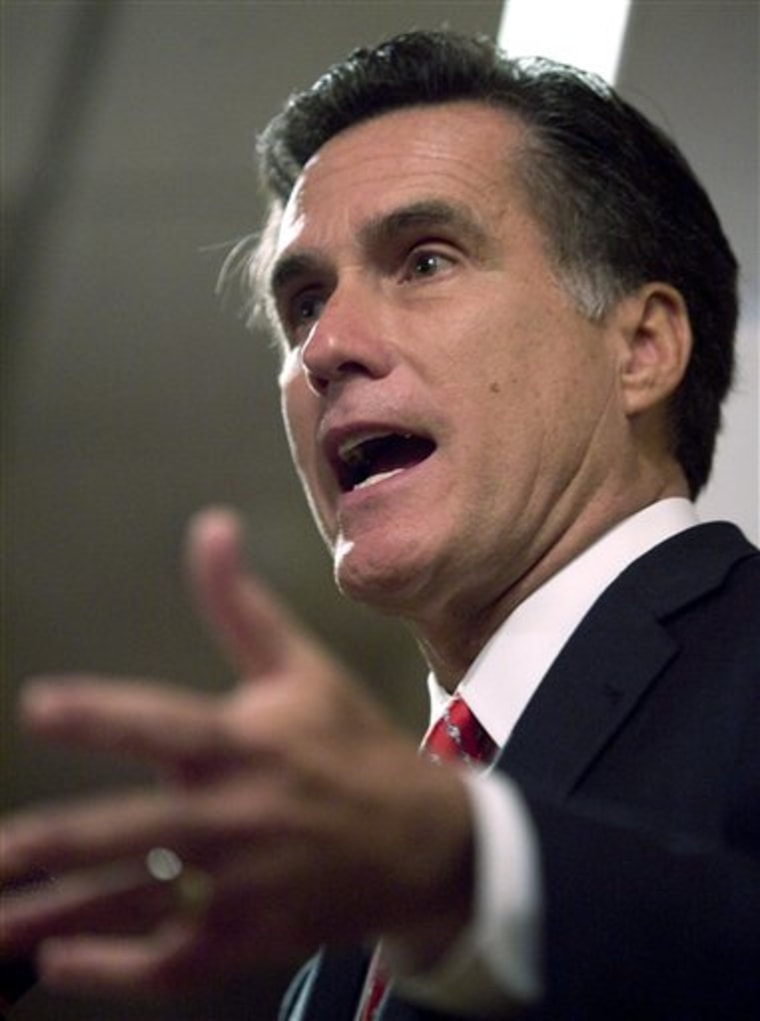Mitt Romney, who leads the Republican presidential field in fundraising, is strongly denouncing the campaign finance reform law co-authored by one of his chief rivals.
The former Massachusetts governor is vehemently opposed to the Bipartisan Campaign Reform Act, saying the revised regulations controlling presidential fundraising impinge on free speech.
His criticisms underscore a major political difference with one of his campaign rivals, Sen. John McCain of Arizona. Romney has also recently criticized McCain on other issues, including immigration.
Constitutional questions
BCRA is the formal name for the "McCain-Feingold" law, a piece of legislation that reshaped election financing and bolstered McCain's upstart political status when President Bush signed it into law in 2002.
"I favor transparency," Romney told The Associated Press on Thursday between campaign stops in New Hampshire. "Let people make contributions and report it on the Web site, so you know who's contributed to whom, but McCain-Feingold has not worked. It's hurt my party, it hurts First Amendment rights. I think it was a bad bill."
On Wednesday, the same day McCain formally announced his candidacy, Romney said in an Internet posting: "The American people should be able to exercise their First Amendment rights without having to think about hiring a lawyer."
One of the law's authors, Rep. Martin Meehan, D-Mass., said Romney's complaints are rooted in politics.
"The law has been ruled constitutional by every court that has looked at it," said Meehan, who worked with Rep. Chris Shays, R-Conn., on a bill that was merged with McCain-Feingold. "Mitt Romney's criticisms are clearly motivated by his campaign against John McCain."
McCain response
Other critics say Romney's complaints don't square with his past calls for campaign finance reform, including a 1994 proposal to publicly fund elections by imposing a 10 percent tax on the contributions to candidates choosing to finance their campaigns privately.
A McCain spokesman dismissed Romney's criticism.
"Senator McCain has fought against the corrupting influence of special interest money in politics," said campaign spokesman Danny Diaz. "As we learned last November, it is critically important that our leaders remain committed to representing the interests of the voters that elected them into office."
McCain-Feingold banned the unregulated, unlimited "soft money" contributions from corporations, unions and wealthy individuals to national political parties and federal candidates.
Critics say that ban redirected donations to "527s," special interest groups with less-stringent disclosure requirements. That is part of the reason Romney says McCain-Feingold has had "unintended consequences" and "driven money into secret corners."
Romney also suggests that provisions in the law prohibit some nonprofit groups from mentioning the name of a federal candidate within 30 days of a primary, or in the months before a general election.
A Washington-based government watchdog group that helped draft the bill disputed that interpretation.
"McCain-Feingold didn't ban any form of free speech," said Mary Boyle, spokeswoman for Common Cause. "It just specified how certain broadcast ads before a primary or a general election can be paid for. They said they can't be paid with union or corporate money, only PAC money that has been contributed by individuals, is legally regulated and is disclosed."
A different Supreme Court
The Supreme Court upheld McCain-Feingold in 2003, but that was before President Bush's appointments to the court. Last week, the court heard arguments in a Wisconsin case challenging the law's restrictions on mentioning candidates by name in issue ads run by special interest groups near the election.
Romney trumpeted his views on campaign finance reform during his unsuccessful 1994 campaign to unseat Sen. Edward M. Kennedy, D-Mass.
Then a millionaire venture capitalist, Romney complained about the cost of the race and said, "For that reason, I would like to have campaign spending limits, and to say, 'We're not going to spend more than this in certain campaigns,' in a campaign for Senate or U.S. representative and so forth. Because otherwise, I think you have money playing far too important a role."
Amid that same race, Romney proposed abolishing political action committees, registering lobbyists, limiting gifts and imposing the 10 percent tax on private donations as an alternative to using personal tax dollars to finance political campaigns.
"I think contributions are fine, I just don't want them to be larger and larger," he said during an October 1994 business forum, a videotape of which is now posted on YouTube.com.
Romney raised $21 million in the first quarter and began the second quarter with nearly $12 million in the bank, the most money of the Republican candidates.
